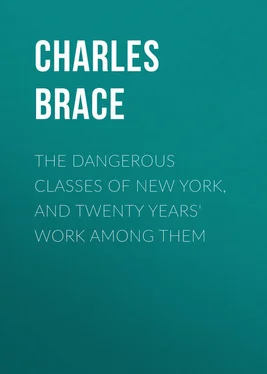Charles Brace - The Dangerous Classes of New York, and Twenty Years' Work Among Them
Здесь есть возможность читать онлайн «Charles Brace - The Dangerous Classes of New York, and Twenty Years' Work Among Them» — ознакомительный отрывок электронной книги совершенно бесплатно, а после прочтения отрывка купить полную версию. В некоторых случаях можно слушать аудио, скачать через торрент в формате fb2 и присутствует краткое содержание. Издательство: Иностранный паблик, Жанр: foreign_antique, foreign_prose, на английском языке. Описание произведения, (предисловие) а так же отзывы посетителей доступны на портале библиотеки ЛибКат.
- Название:The Dangerous Classes of New York, and Twenty Years' Work Among Them
- Автор:
- Издательство:Иностранный паблик
- Жанр:
- Год:неизвестен
- ISBN:нет данных
- Рейтинг книги:5 / 5. Голосов: 1
-
Избранное:Добавить в избранное
- Отзывы:
-
Ваша оценка:
- 100
- 1
- 2
- 3
- 4
- 5
The Dangerous Classes of New York, and Twenty Years' Work Among Them: краткое содержание, описание и аннотация
Предлагаем к чтению аннотацию, описание, краткое содержание или предисловие (зависит от того, что написал сам автор книги «The Dangerous Classes of New York, and Twenty Years' Work Among Them»). Если вы не нашли необходимую информацию о книге — напишите в комментариях, мы постараемся отыскать её.
The Dangerous Classes of New York, and Twenty Years' Work Among Them — читать онлайн ознакомительный отрывок
Ниже представлен текст книги, разбитый по страницам. Система сохранения места последней прочитанной страницы, позволяет с удобством читать онлайн бесплатно книгу «The Dangerous Classes of New York, and Twenty Years' Work Among Them», без необходимости каждый раз заново искать на чём Вы остановились. Поставьте закладку, и сможете в любой момент перейти на страницу, на которой закончили чтение.
Интервал:
Закладка:
One often-proposed remedy for the ills of our tenement-house system – the "Model Lodging-house" – has never been fairly tried here. The theory of this agency of reform is, that if a tenement-house can be constructed on the best sanitary principles, with good ventilation, with limited number of tenants, no overcrowding, and certain important conveniences to the lodgers, all under moral supervision (so that tenants of notoriously bad character are excluded), and such a house can be shown to pay, say seven per cent. net, this will become a "model" to the builders of tenement-houses; some building after the same style, because public opinion and their own conscience require it, others because competition compels it. Thus, in time, the mode of structure and occupancy of all the new tenement-houses would be changed. But to attain this desirable end, the model houses must first pay a profit, and a fair one. So long as they do not succeed in this, they are a failure, however benevolent their object and comfortable their arrangements. In this point of view, the "Waterloo Houses," in London, are a success, and do undoubtedly influence the mode of building and management of private tenement-houses; in this, also, the "Peabody Houses" are not a success, and will have no permanent influence.
The Model Houses in London for lodging single men have, as the writer has witnessed, changed and elevated the whole class of similar private lodging-houses.
The experiment ought to be tried here, on a merely business basis, by some of our wealthy men. The evil of crowded tenement-houses might be immensely alleviated by such a remedy.
CHAPTER VI
The power of the appetite for alcoholic stimulus is something amazing. A laboring-man feels it especially on account of the drag on his nervous system of steady and monotonous labor, and because of the few mental stimuli which he enjoys. He returns to his tenement-house after a hard day's work, "dragged out" and craving excitement; his rooms are disagreeable; perhaps his wife cross, or slatternly, and his children noisy; he has an intense desire for something which can take him out of all this, and cause his dull surroundings and his fatigue to be forgotten. Alcohol does this; moreover, he can bear alcohol and tobacco, to retard the waste of muscle, as the sedentary man cannot. In a few steps, he can find jolly companions, a lighted and warmed room, a newspaper, and, above all, a draught which, for the moment, can change poverty to riches, and drive care and labor and the thought of all his burdens and annoyances far away.
The liquor-shop is his picture-gallery, club, reading-room, and social salon, at once. His glass is the magic transmuter of care to cheerfulness, of penury to plenty, of a low, ignorant, worried life, to an existence for the moment buoyant, contented, and hopeful. Alas that the magician who thus, for the instant, transforms him with her rod, soon returns him to his low estate, with ten thousand curses haunting him! The one thus touched by the modern Circe is not even imbruted, for the brutes have no such appetite; he becomes a demonized man; all the treasures of life are trampled under his feet, and he is fit only to dwell "among the tombs." But, while labor is what it is, and the liquor-shop alone offers sociality and amusement to the poor, alcohol will still possess this overwhelming attraction. The results in this climate, and under the form of alcoholic stimulus offered here, are terrible beyond all computation. The drunkards' homes are the darkest spots even in the abyss of misery in every large city. Here the hearts of young women are truly broken, and they seek their only consolation in the same magic cup; here children are beaten, or maimed, or half-starved, until they run away to join the great throng of homeless street-rovers in our large towns, and grow up to infest society. From these homes radiate misery, grief, and crime. They are the nests in which the young fledgelings of misfortune and vice begin their flight. Probably two-thirds of the crimes of every city (and a very large portion of its poverty) come from the over-indulgence of this appetite. As an appetite, we do not believe it can ever be eradicated from the human race.
If we look at criminal statistics for the effects of this appetite, we will find that in the New York City prisons, during 1870, there were, out of 49,423 criminals, 30,507 of confessedly intemperate habits, while no doubt, with a large portion of the rest, indulgence in liquor was the cause of their offenses.
In the Albany Penitentiary there were, in 1869-70, 1,093 convicts, of whom 893 admitted they were intemperate. Of this whole number only 563 could read and write, and only 568 were natives of this country.
Among the children of misfortune in our city, the homeless boys and girls, and those compelled by poverty to attend the Industrial Schools (which I shall hereafter describe), it would be safe to say that ninety out of a hundred are the children of drunkards.
As a direct cause of crime in children, drunkenness takes but a small place. This is not an appetite of childhood. Very few boys or girls of the poorest class are addicted to it till they become mature.
The effort for Total Abstinence has been, indeed, an untold blessing to the working class in this country and many parts of Europe. It may be said, in many regions, to have broken the wand of the terrible enchantress. It has introduced a new social habit in drinking. It has connected abstinence with the ceremonial of religion and the pleasures of social organizations. It has addressed the working-man – as, in fact, he often is – as a child, and saved him from his own habits, by a sworn abstinence. Thousands of men could never have freed themselves from this most tyrannical appetite, except by absolute refusal to touch. In fact, it may be said that no vice is ever abandoned by gradual steps. The only hope for any one under the control of any wrong indulgence is in entire and immediate abandonment.
With those, too, who had not fallen under the sway of this appetite, especially if of the working class, abstinence was the safest rule.
The "Total Abstinence Reform" in this country, in Great Britain, and in Sweden, was one of the happiest events that ever occurred in the history of the working classes. Its blessings will descend through many generations. But in its nature it could not last. It was a tremendous reaction against the heavy and excessive drinking of fifty years since. It was a kind of noble asceticism. Like all asceticism, it could not continue as a permanent condition. Its power is now much spent. Wherever it can be introduced now among the laboring classes, it should be; and we believe one of the especial services of the Irish Catholic clergy, at this day, to the world, is in supporting and encouraging this great reform.
All who study the lower classes are beginning, however, now to look for other remedies of the evil of intemperance.
It has become remarkably apparent, during the last few years, that one of the best modes of driving out low tastes in the masses is to introduce higher. It has been found that galleries and museums and parks are the most formidable rivals of the liquor-shops. The experience near the Sydenham Palace, in England, and other places of instructive and pleasant resort for the laboring masses, is, that drinking-saloons do not flourish in opposition. Wherever, in the evening, a laboring-man can saunter in a pleasant park, or, in company with his wife and family, look at interesting pictures, or sculpture, or objects of curiosity, he has not such a craving for alcoholic stimulus.
Even open-air drinking in a garden – as is so common on the Continent – is never so excessive as in an artificial-lighted room. Where, too, a working-man can, in a few steps, find a cheerfully-lighted reading-room, with society or papers, or where a club is easily open to him without drinking, it will also be found that he ceases to frequent the saloon, and almost loses his taste for strong drink.
Читать дальшеИнтервал:
Закладка:
Похожие книги на «The Dangerous Classes of New York, and Twenty Years' Work Among Them»
Представляем Вашему вниманию похожие книги на «The Dangerous Classes of New York, and Twenty Years' Work Among Them» списком для выбора. Мы отобрали схожую по названию и смыслу литературу в надежде предоставить читателям больше вариантов отыскать новые, интересные, ещё непрочитанные произведения.
Обсуждение, отзывы о книге «The Dangerous Classes of New York, and Twenty Years' Work Among Them» и просто собственные мнения читателей. Оставьте ваши комментарии, напишите, что Вы думаете о произведении, его смысле или главных героях. Укажите что конкретно понравилось, а что нет, и почему Вы так считаете.












